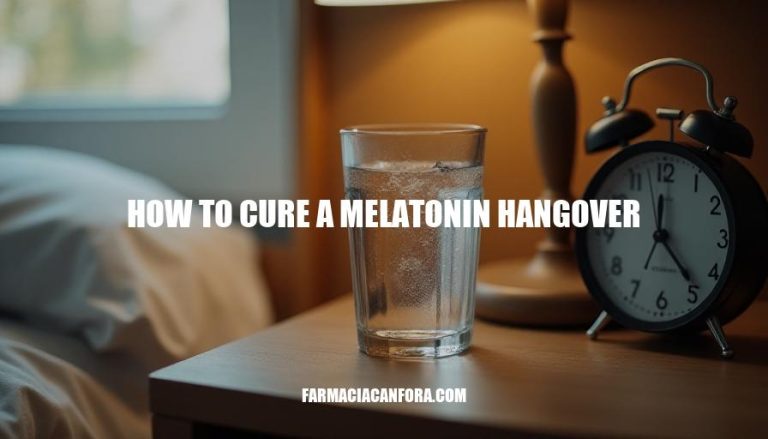


You know how some people take melatonin to help them sleep better? Well, sometimes they wake up feeling pretty rough the next day. This is called a melatonin hangover.
It happens because melatonin stays in your system longer than it should, and that can cause problems like headaches, dizziness, and feeling really groggy.
Some people even get mood swings or feel really irritable. It’s not fun, and it can make it hard to get through the day.
A melatonin hangover occurs when an individual experiences unpleasant side effects the day after taking melatonin supplements. These side effects can include headaches, grogginess, dizziness, daytime sleepiness, nausea, mood changes, and disorientation.
Overuse of melatonin supplements is a primary cause of melatonin hangovers. Many people take doses much higher than the body naturally produces, which can overload the body and lead to prolonged effects the next day.
The body naturally produces around 0.3 milligrams of melatonin per day, but most supplements contain at least 3 milligrams or even higher. Taking too much melatonin can disrupt the body’s natural production of the hormone and cause these side effects.
Individual sensitivity to melatonin also plays a significant role in melatonin hangovers. Some people are more sensitive to melatonin’s effects than others.
Factors such as age, health conditions, and individual body chemistry can influence how a person reacts to melatonin. Older adults and children tend to be more susceptible to hangover symptoms. Additionally, underlying health conditions or medications that affect sleep can exacerbate the effects of melatonin.
In summary, a melatonin hangover is caused by taking too high a dose of melatonin supplements and individual sensitivity to the hormone.
It’s important to use melatonin cautiously and at the lowest effective dose to avoid these unpleasant side effects.
Hydrate: Drink a full glass of water as soon as you wake up. Continue to sip water throughout the day to stay hydrated.
Consume Caffeine: Brew yourself a cup of coffee or tea. Caffeine can help combat drowsiness and increase alertness.
Light Exercise: Engage in a gentle physical activity, like a short walk or some stretching exercises.
This can help wake up your body and improve circulation.
Eat a Balanced Breakfast: Include foods rich in protein and healthy fats. Eggs, avocado, and nuts are good options that can help sustain your energy levels.
Expose Yourself to Natural Light: Spend some time outside in natural daylight. This can help regulate your circadian rhythm and signal to your body that it’s time to be awake.
Avoid Naps: Try to stay awake and avoid napping throughout the day.
This will help reset your sleep schedule.
Stay Active: Keep your body moving with light activities to prevent lethargy. Avoid strenuous exercise, which might make you feel more tired.
Start with a low dose: Begin with 0.5-1 mg of melatonin and increase gradually if needed.
Take it earlier: Consume melatonin at least 6 hours before bedtime.
Use time-release tablets: These provide melatonin gradually over several hours.
Avoid alcohol and sedatives: Don’t mix melatonin with alcohol or other sedating medications.
Improve sleep hygiene: Maintain a consistent sleep schedule, create a relaxing bedtime routine, and limit screen time before bed.
Consider natural alternatives: Try herbal teas, magnesium supplements, or valerian root.
Consult a healthcare provider: If symptoms persist, seek medical advice before switching to other supplements.
A melatonin hangover occurs when an individual experiences unpleasant side effects the day after taking melatonin supplements, including headaches, grogginess, dizziness, daytime sleepiness, nausea, mood changes, and disorientation.
To cure a melatonin hangover, hydrate by drinking water throughout the day, consume caffeine to combat drowsiness, engage in light exercise to improve circulation, eat a balanced breakfast to sustain energy levels, expose yourself to natural light to regulate your circadian rhythm, avoid naps to reset your sleep schedule, and stay active with light activities.
Additionally, consider starting with a low dose of melatonin, taking it earlier, using time-release tablets, avoiding alcohol and sedatives, improving sleep hygiene, trying natural alternatives, and consulting a healthcare provider if symptoms persist.